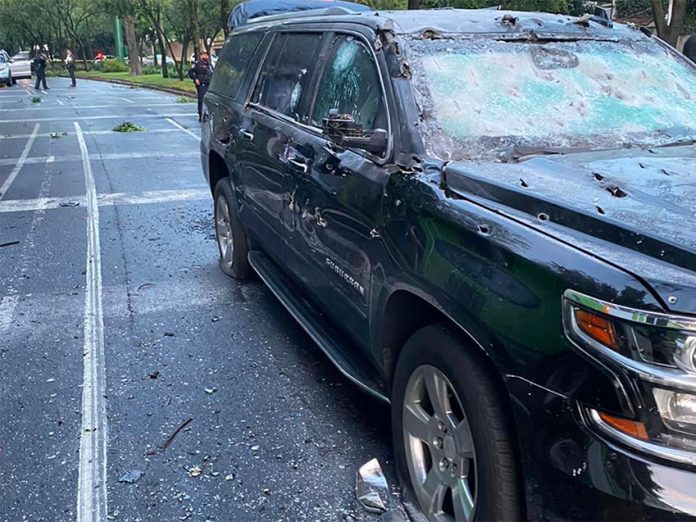“Hugs, not bullets?” scoffed Antonio Rivera, a businessman in the central Mexican town of Irapuato, referring to President López Obrador’s strategy for ending more than a decade of increasing violence. “This is a war zone.”
As head of the local branch of business confederation Coparmex, Rivera has witnessed how intensifying drug cartel wars has turned his home state of Guanajuato — one of the country’s top car production centers — into the murder capital of Mexico.
Even López Obrador last month said violence in Guanajuato was “out of control” — and that was before heavily armed men burst into a drug rehabilitation centre for young people in broad daylight in Irapuato on July 1 and gunned down 28.
The president insists his government has “halted the historic upward trend” in homicides nationwide, thanks to the creation of the National Guard, a militarized police force, and the close tabs his administration keeps on the situation through daily 6 a.m. security cabinet meetings. But the number of murders rose 3% to a record 34,608 in the first year of his administration and this year hit 14,631 by May.
On a tour of Guanajuato and two other violence-stricken states, Jalisco and Colima, last week, López Obrador was heckled by residents who believe things are getting worse.
A poll by El Financiero newspaper at the start of July found 63% of respondents disapproved of his handling of security. Only 23% reckoned he was doing a good job.
“I don’t think the security strategy makes any sense at all,” said Juan Pablo Hernández, a businessman in Guadalajara, home to one of Mexico’s most aggressive gangs, the Jalisco New Generation Cartel (CJNG). “I don’t see a clear strategy yet.”
López Obrador intended his more peaceful approach to contrast with President Felipe Calderón’s doomed 2006-12 “war on drugs,” which sent violence skyrocketing, and the record of his immediate predecessor Enrique Peña Nieto, who failed to contain the mounting murder rate in his 2012-18 term.
But the president drew fierce criticism for going out of his way personally to greet the mother of jailed Sinaloa Cartel boss Joaquín “El Chapo” Guzmán earlier this year — something he says was a humanitarian gesture towards a woman in her 90s “who deserves all my respect no matter who her son is.”
Last year, police botched the capture of Ovidio Guzmán, one of “El Chapo’s” sons, during an operation in the cartel stronghold of Culiacán, when the traffickers flooded the city with gunmen. López Obrador ordered Guzmán’s release, saying he wanted to avoid bloodshed.
Rivera described López Obrador’s strategy as “the least successful” in recent years. In Guanajuato, the CJNG, a big international drug trafficking organization that is believed to control as much as two-thirds of the U.S. market, has been battling the local Santa Rosa de Lima cartel for territorial control.
The result was 1,903 murders in the state between January and June — 13% of the national total. “We feel defenceless,” said Rivera.
Despite the “hugs, not bullets” rhetoric — designed to focus less on fighting cartels than giving young people education grants and apprenticeships to stop them falling into crime — López Obrador “immediately created the National Guard as a military institution … and cancelled all crime prevention programs,” said Catalina Pérez Correa, a security expert at Mexico’s CIDE university.
“There is no different strategy — that’s a false premise,” she said. “It didn’t work before, why should it work now?”
The violence has escalated into areas previously off-limits to major cartels, such as the CJNG’s dawn ambush on Mexico City’s police chief last month. More than two dozen hitmen poured out of a truck after blocking the road in one of the capital’s wealthiest neighbourhoods and raked Omar García Harfuch’s armoured SUV with bullets. Harfuch survived. but two bodyguards and a bystander were killed.
Two weeks before the attack, the cartel targeted Uriel Villegas, a federal judge who heard organized crime cases, including one involving a son of the CJNG’s fugitive leader Nemesio Oseguera. Cartel members stormed his home in Colima state and executed him and his wife.
“Brazen attacks by the CJNG against public officials … underscored the organization’s heightened sense of impunity in directly confronting the Mexican state,” Empra, a consultancy, said in its June security report.
A decade ago, the border city of Ciudad Juárez was Mexico’s murder capital. “It felt so far away then. But we’re now going through what they did — it’s endless,” said Raúl Calvillo, head of the Irapuato ¿Cómo vamos? Citizen’s Observatory, which tracks local crime trends.
For businesses, extortion is also a serious problem. “A young man will come in, offer to protect you as if he were Robin Hood, in exchange for you letting him sell drugs on the premises,” said Rafael — not his real name — who runs restaurants in 22 of Mexico’s 32 states. “They’re violent. You can’t negotiate with them … I’ve had to accept.”
Rivera predicted that the Covid-19 crisis, which has pushed millions out of work, would boost violent crime.
Pérez Correa was also downbeat. “We’re losing [this war],” she said. “There is no sign of things getting better.”
© 2020 The Financial Times Ltd. All rights reserved. Please do not copy and paste FT articles and redistribute by email or post to the web.
